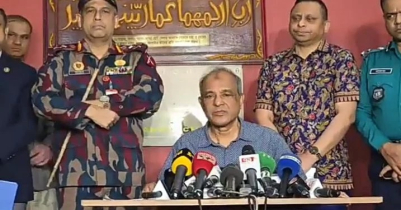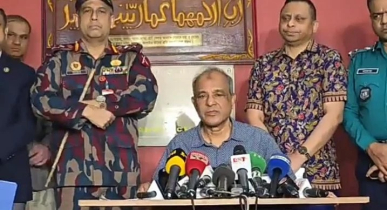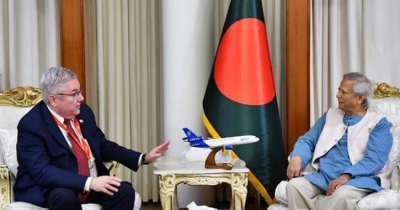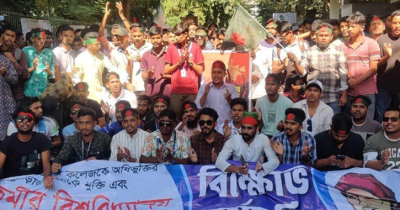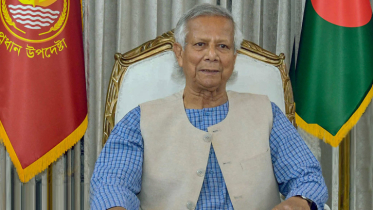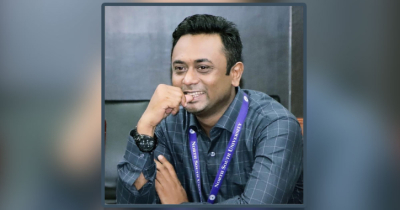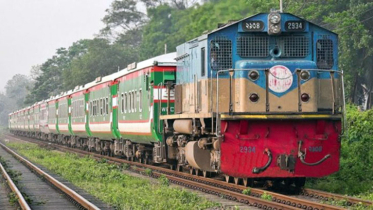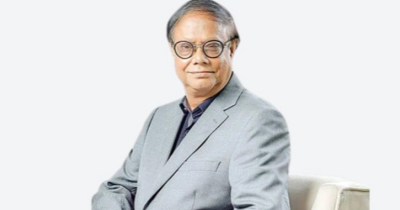Chief Adviser Yunus pays tribute to language martyrs on International Mother Language Day
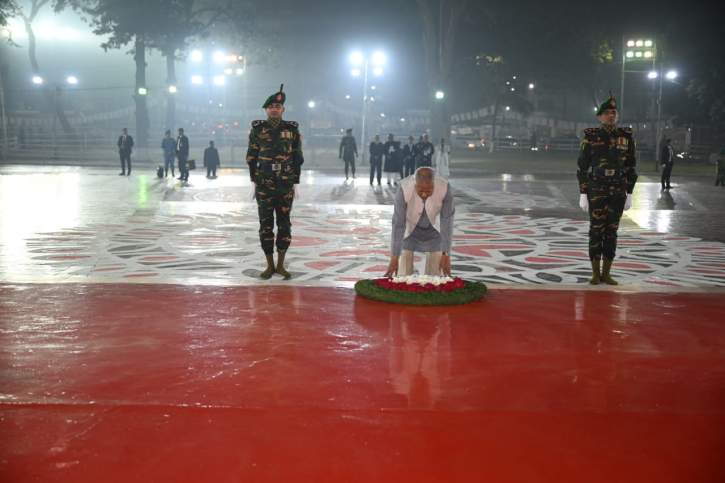
Chief Adviser Prof Muhammad Yunus paid rich tributes to the martyrs of the historic Language Movement by placing a wreath at the Central Shaheed Minar, marking ‘Amar Ekushey’—the International Mother Language Day and Shaheed Dibosh on Friday.
He placed the floral wreath at the Central Shaheed Minar shortly after midnight.
Dhaka University Vice-Chancellor Professor Niaz Ahmed Khan welcomed the Chief Adviser upon his arrival at the Central Shaheed Minar, said Chief Adviser’s Deputy Press Secretary Abul Kalam Azad Majumder.
On Thursday, the Chief Adviser unveiled a commemorative postage stamp, an inaugural envelope, and a seal on the occasion of International Mother Language Day.
International Mother Language Day was proclaimed by the General Conference of the United Nations Educational, Scientific and Cultural Organization (UNESCO) in November 1999. The idea to celebrate International Mother Language Day was an initiative of Bangladesh. The UN General Assembly welcomed the proclamation of the day in its resolution of 2002.
The nation is set to observe "Amar Ekushey," the Language Martyrs' Day and International Mother Language Day, on Friday, marking the supreme sacrifice of the language heroes for upholding the dignity of the mother tongue, Bangla.
The day will also be observed around the world as UNESCO recognised ‘Ekushey February’ as International Mother Language Day on November 17, 1999.
Walking barefoot to Dhaka’s Central Shaheed Minar with wreaths and flowers, singing 'Amar Bhaiyer Rokte Rangano Ekushey February,' people from all walks of life will pay their respects to the heroes of the Language Movement who sacrificed their lives for achieving the recognition of Bangla as the state language of erstwhile Pakistan.
On February 21, 1952, students and people in Dhaka took to the streets in protest against the then Pakistani government's denial of Bangla as the national language and the imposition of Urdu as the only official language of Pakistan.
Salam, Barkat, Rafiq, Jabbar, and a few other brave sons of the soil were killed in police firing on this day in 1952 when students came out in a procession from the Dhaka University campus, breaching Section 144, to press home their demand for the recognition of Bangla as a state language of then Pakistan.
The day is a public holiday.
Chief Adviser Professor Dr Muhammad Yunus issued a message on the eve of the day.
“On the occasion of Martyrs’ Day and International Mother Language Day, I pay tribute to people of all languages in the world, including Bangla. Since 2000, Bangladesh and UNESCO have been jointly observing this day in a befitting manner. ‘Make Languages Count for Sustainable Development’ as this year’s UNESCO topic is justified,” said Dr Yunus.
He said the interim government, established through the July Uprising, is working consistently to defend the dignity of the nation and its languages, which are essential to growth and prosperity.
“It is also working to ensure that the Bangla language is used in information technology. Textbooks in the mother languages of various ethnic groups, including Braille books, are being distributed free of charge,” he added.
National dailies will publish special supplements marking the day, while Bangladesh Betar, Bangladesh Television, and private radio and television channels will air special programmes on the occasion.
Multi-tier security measures were taken at the Central Shaheed Minar ahead of February 21.
Dhaka Metropolitan Police (DMP) Commissioner Sheikh Md Sajjat Ali on Thursday said floral tributes will be organised in three phases, with VVIPs and VIPs laying flowers from 12:01 am to 12:40 am. To avoid inconvenience, the general public was requested not to arrive during this period.
Addressing a security briefing in Dhaka on Thursday regarding preparations for the observance of International Mother Language Day, Commissioner Sajjat Ali urged visitors to adhere to the designated timings and maintain discipline while paying tribute at the monument.
According to a DMP media release, attendees are advised to follow these designated routes. The prescribed entry route for the Shaheed Minar includes Palashi Crossing – Sculpture Crossing – Jagannath Hall Crossing, while the exit route will be via Ramna Crossing – Doel Chattar. Diversions will be enforced at Shahbagh Crossing, Nilkhet Crossing, Shahidullah Hall Crossing, Chankharpul Crossing, Palashi Crossing, and Bakshibazar Crossing to ensure smooth movement and security.
Authorities have called on the public to follow these instructions to facilitate an orderly and safe tribute at the Central Shaheed Minar.


